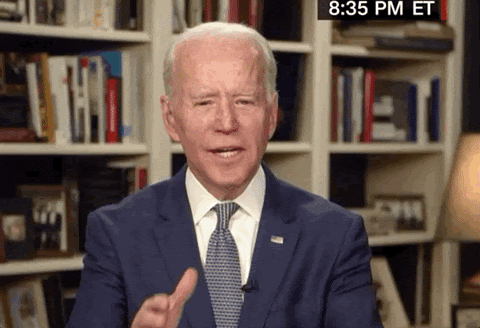Novum Alpha - Daily Analysis 22 January 2021 (10-Minute Read)
A fantastic Friday to you! Does it feel like we're living in a new world? In many ways we are, as the Biden administration gets into the driver's seat to try and bring the crippling coronavirus pandemic under control.
In brief (TL:DR)
In today's issue...
|
Market OverviewWhile Americans are waking up to a fresh administration brimming with competence and confidence, it is also coming to terms with just how much had been hidden by the previous administration, of the true extent of the damage wrought by the coronavirus pandemic.
Like buying a used car and bringing it to the mechanic for the first time, Biden and his team will have their work cut out for them, especially after it became clear that the Trump administration had downplayed the extent and scope of the damage that the pandemic had caused.
Biden for his part has not minced words and made patently clear that the situation is serious and not likely to resolve itself anytime soon.
Stocks in Asia opened the morning lower on the realization that Trump had concealed a lot more from the American people than thought earlier with Tokyo's Nikkei 225 (-0.37%), Sydney’s ASX 200 (-0.08%) and Hong Kong's Hang Seng Index (-0.32%) all opening lower, while Seoul’s KOSPI (+0.43%), was higher on expectations of firmer demand for chips and work-from-home gear.
|
 |
|
1. Biden Needs to Fix the Pandemic Before the Economy
Less than 24 hours in office and U.S. President Joe Biden has been busy, signing no less than 10 executive orders to combat the coronavirus pandemic that has left hundreds of thousands of Americans dead and the economy in tatters.
Biden knows that the U.S. economy cannot even look to recovery if the pandemic doesn’t get under control and has called for a 100-day mask mandate, to urge Americans to wear a mask.
The marketing is clever, to call it an “indefinite” wearing of masks would be too much for Americans to bear or “wear” in this case, but a hundred days sounds more doable, and it sounds like there is some degree of finality (although there really isn't).
The 100-day mask mandate also coincidentally coincides with Biden’s first 100 days in office, a time when a new President’s performance is typically assessed.
As the experience in China demonstrates, keeping things under control is far from a 100-day task, it’s ongoing.
The good news is that the conspiracy theorists who had counted on massive protests and an uprising in Washington D.C. and state capitols everywhere, to contest Biden’s inauguration were thoroughly disappointed.
In Montana, just one Trump supporter appeared, an image that has left this fringe element rudderless and disillusioned.
That should help Biden’s campaign to bring the pandemic to heel, as overt resistance is reduced and deprived of his bully pulpit, the poisoning misinformation campaign of Trump that politicizes the wearing of masks should hopefully be reduced.
Biden also signed an executive order that mandates the wearing of masks at airports and in certain types of public transportation such as many trains, ships, intercity buses and airplanes.
Coupled with Biden’s stimulus plan that is calling for US$1,400-per-person direct payments to most households and a US$400-a-week unemployment insurance supplement through September, those additional payments should provide temporary respite for an economy that desperately needs to get the pandemic under control.
|
 |
|
2. Intel Insists on Making Its Own Chips
Chipmaking giant Intel’s shares took a beating when incoming CEO Pat Gelsinger made clear that the firm will still continue to manufacture the bulk of its own chips, but shares in the firm have since rebounded.
Speaking with analysts at a news conference yesterday, Gelsinger said,
“I am confident that the majority of our 2023 products will be manufactured internally.”
The comments sent shares lower, countering calls from investors to shed the manufacturing arm of the industry and focus on other more lucrative sectors.
And while the margins may be bigger for Intel if they were to shed the high capital costs of manufacturing chips, if the coronavirus pandemic was any lesson about supply lines, there’s such a thing as outsourcing too much.
Given that microchips are a key strategic asset, reliance on manufacturing bases in Taiwan and South Korea could be tricky, especially if geopolitical tensions escalate between China and the U.S. or as in the case of the pandemic, a break in supply lines occurs.
When the coronavirus pandemic first hit the U.S., America’s deficiencies in manufacturing medical equipment and supplies was laid bare.
Gelsinger is taking the reins of Intel in the midst of its worst crisis in at least a decade.
The largest chipmaker for most of the past thirty years, Intel dominated the US$400 billion semiconductor industry by making the best designs in its own cutting-edge factories.
But Intel’s fortunes started to decline as other U.S. chipmakers shuttered factories and outsourced production to highly specialized and purpose-built foundries in Taiwan, China and South Korea.
Intel held out, arguing that doing both design and manufacture within the firm, improved each side of its operations and created better semiconductors.
Over the past few years, that strategy has proved costly for Intel’s shareholders, with the likes of Nvidia (+3.75%) overtaking the firm as the world’s largest chipmaker by market cap and as Intel’s own factories failed to deliver the advances in production techniques needed to keep up with Taiwan Semiconductor Manufacturing Company (-2.23%) and Samsung Electronics (+0.23%).
Intel right now looks to be oversold, especially when investors consider that its most recent margins stood at 56.8% and historically have hovered around 60% - amazing considering that Intel still does the bulk of its own manufacturing and margins in manufacturing businesses are typically a fraction of that.
Demand for laptop chips have also been robust, even if government and cloud business demand has declined.
While the decline in sales of chips for cloud servers is a concern, it could be more a sign of companies working their ways through existing stocks of chips than indicative of a longer term trend.
Prior to the pandemic, a more cogent argument could be made for Intel to ditch manufacturing and focus on more lucrative outsourcing, but that case is no longer cut and dried.
Recently, vehicle production lines in Volkswagen (+2.80%) and Honda (-1.11%) were halted because of a shortage of chips due to shipping logjams.
Intel has the technology and the potential to fix its manufacturing problems and place itself as a key node in the semiconductor industry and right now its share price doesn’t necessarily reflect that.
|
 |
|
3. Abandon All Hope, Bitcoin Bombs Below US$30,000
When is the best time to buy Bitcoin? If you can’t stomach volatility, probably never.
To understand the nature of the beast that is Bitcoin, is to understand what an unconstrained asset is.
Unlike any other asset class, Bitcoin’s price (not the equivalent of value) is a function of perception.
Perceived demand, perceived supply and a dose of perceived manipulation, all contribute to making Bitcoin one of the most volatile assets on the planet.
The most recent rout has been attributed to comments made by U.S. Treasury Secretary Janet Yellen, before a Senate confirmation committee, who noted that Bitcoin and cryptocurrencies needed to be regulated, because the bulk of cryptocurrency transactions facilitate crime.
Investors reacted to comments by Yellen of trying to “curtail” the use of cryptocurrencies such as Bitcoin, over concerns that they are “mainly” used for illegal activities.
While it’s estimated that just 0.34% of all Bitcoin transactions in 2020 were criminal in nature, that hasn’t stopped Bitcoin traders from dumping the cryptocurrency on concerns that U.S. regulators will crack down on the sector.
The reason why governments, especially the United States, might have an axe to grind with Bitcoin, is because of a growing narrative that Bitcoin offers a viable alternative to the dollar, which some fear is being progressively debased through money printing and fiscal measures.
Curtailing the use of Bitcoin could come in various forms, including putting caps on the value of transactions conducted in Bitcoin through regulated cryptocurrency exchanges, placing limits on the number of off ramps for Bitcoin to purchase goods and services in the real world, and even potentially stifling moves by the likes of PayPal (+1.79%) to make it more easy to spend cryptocurrency.
Like any other market, Bitcoin traders can get jittery on uncertainty and Yellen’s comments have placed the fear of Washington into the heart of cryptocurrency traders that the U.S. may tighten regulation when it comes to the nascent digital assets.
But curtailment is very different from a ban and regulation in and of itself is not necessarily a bad thing per se.
Recall that institutional investors like certainty and nothing provides certainty like rules and regulations, which are painfully absent in the cryptocurrency space currently.
And while the threat of uncertain regulation may lead to some short term pullback in Bitcoin and other cryptocurrencies, it would do wonders to facilitate more institutional participation.
What that participation means for price however is an entirely different matter and requires a reversion to reading tea leaves, tarot cards and the Tao.
|
What can Digital Assets do for you?While markets are expected to continue to be volatile, Novum Alpha's quantitative digital asset trading strategies have done well and proved resilient.
Using our proprietary deep learning and machine learning tools that actively filter out signal noise, our market agnostic approach provides one of the most sensible ways to participate in the nascent digital asset sector.
If this is something of interest to you, or if you'd like to know how digital assets can fundamentally improve your portfolio, please feel free to reach out to me by clicking here.
|
 |
|
Looking to trade cryptocurrency yourself? Then why not try CryptoHero, a member of the Novum Group.
Enjoy some of the high performing algorithms that Novum Alpha uses, absolutely free!
Because you can't be up 24 hours trading cryptocurrency markets, CryptoHero's free bots do the trading for you.
Simple and intuitive for crypto beginners to set up and run, CryptoHero is currently available on the Web and iOS with an Android version ready in 2021.
Try our one click copy bot settings with the button below and enjoy 1-month Premium Subscription absolutely free!
|
|
Jan 22, 2021